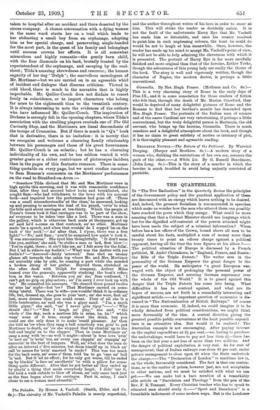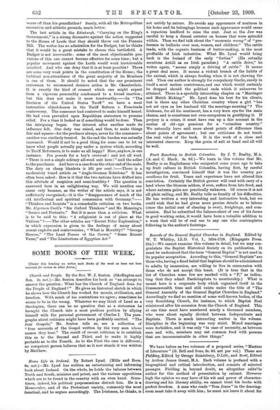THE QUARTERLIES.
IIx "The New Radicalism" in the Quarterly Review the principles , of the Government policy and the practical application of them are denounced. with an energy which leaves nothing to be desired. And, indeed, the grossest Socialism is recommended in speeches which make us wonder how the men who uttered them can possibly have reached the posts which they occupy. What could be more amazing than that a Cabinet Minister should use language which, but for the dignified self-restraint of the person attacked might have been made the subject of a. criminal information? When. before bass. law officer of the Crown, bound above all men to be careful about his facts, multiplied a sum of money more than twenty times to point an odious charge against a political opponent, having all the time the true figures at his elbow ?- 'The political situation of Europe is discussed by a French publicist, M. Andre Cheradame, in "England, France, and Russia: the Rffie of the Triple Entente." The writer sees in the personality of the German Emperor the great danger to the peace of the world. He anticipates "a great European war, waged with the object of prolonging the personal power of the German Emperor, and assuring German supremacy over the whole of the Old World." It is to guard against this danger that the Triple Entente has come into being. What difficulties it has to contend against, and what are its hopes of success, are set forth in a remarkably interesting and significant article.—An important question of economics is dis- cussed in "The Nationalisation of British Railways." Of course it is more than economic. If, indeed, we could imagine it to be wholly detached from political considerations, we might think more favourably of the idea. A central direction giving the greatest possible public convenience at the least possible expendi. tire is an attractive idea. But would it be realised ? The Australian example is not encouraging. After paying interest on the capital expenditure at 34 per cent.—we, having to purchase the undertakings, would have to pay not less than 41—there has been on the last year a net loss of more than two millions. Anti the danger of political exploitation is very real. As for cost of management, that of Italian railways rose from 81 per cent. under private management to close upon 90 when the State undertook the charge.—The "Declaration of London" re maritime law is, on the whole, favourably considered. The fact is that our conten- tions, as in the matter of prizes, however just, are not acceptable, to other nations, and we must be satisfied with what we can get. —We can make but a bare mention of a remarkably able article on "Darwinism and Theology" from the pen of the Rev. F. R. Tennant. Every Christian teacher who has to speak to educated men should study it —" Sport and Decadence" is a, formidable indictment of some.modern ways. But is the Londoner
worse off than his grandfather? Surely, with all the Metropolitan recreation and athletic grounds, much better.
The last article in the Edinburgh, "Carrying on the King's Government," is a strong dissuasive against the action suggested to the House of Lords that they should throw out the Finance Bill. The writer has no admiration for the Budget, but he thinks that it would be a great mistake to choose this battlefield. A Budget is not irrevocable : some of the most objectionable pro- visions of this one cannot become effective for some time ; but a popular movement against the Lords would work irretrievable mischief. And who can deny that it is at least possible? There are some very weak points in the constitution of the House; the habitual non-attendance of the great majority of its Members is one of them. It should be noted that the one prominent statesman to recommend decisive action is Mr. Chamberlain. It is exactly the kind of counsel which one might expect from a vigorous personality condemned to a forced inaction ; but this does not make it more trustworthy.—In "The Revision of the United States Tariff" we have a most instructive object-lesson in the Tariff Reform v. Free-trade controversy. The consumer had contrived to make himself heard. He had even prevailed upon Republican statesmen to promise relief. For a time it looked as if something would be done. Then the intriguing began. One interest after another made its influence felt. One duty was raised, and then, to make things fair and square—for the producer always, never for the consumer— another was similarly treated. In the end the burden was actually increased. Would it not be a good thing for some one to let us know what people actually pay under a system which, according to Tariff Reformers, is to make us all happy? Here, anyhow, is one instance. Ten pounds for a boy's overcoat ! and not all wool. " There is not a single solitary all-wool suit here !" said the seller to the purchaser. And here is a case from the other end of the scale. The duty on cheap blankets is 165 per cent. !—There is a moderately toned article on "Anglo-German Relations." It has often been asked : How is it that the two nations have drifted into this attitude of suspicion and semi-hostility ? The question is answered here in an enlightening way. We will mention one cause only because, as the writer of the article says, it is not sufficiently recognised,—it is the "disappearance of much of the old intellectual and spiritual communion with Germany."— " Thinkers and Ironists " is a remarkable criticism on two books, Mr. Algernon Cecil's "Six Oxford Thinkers" and Mr. Manning's "Scenes and Portraits." But it is more than a criticism. What is to be said to this : "A religionist is out of place at the Vatican" ?—The other articles are "Recent Polar Exploration," in which expression is given to the feelings of many about recent exploits and controversies ; "What is Morality?" "George Borrow," "The Land Forces of the Crown," "Some Recent Verse," and "The Limitations of Egyptian Art."











































 Previous page
Previous page